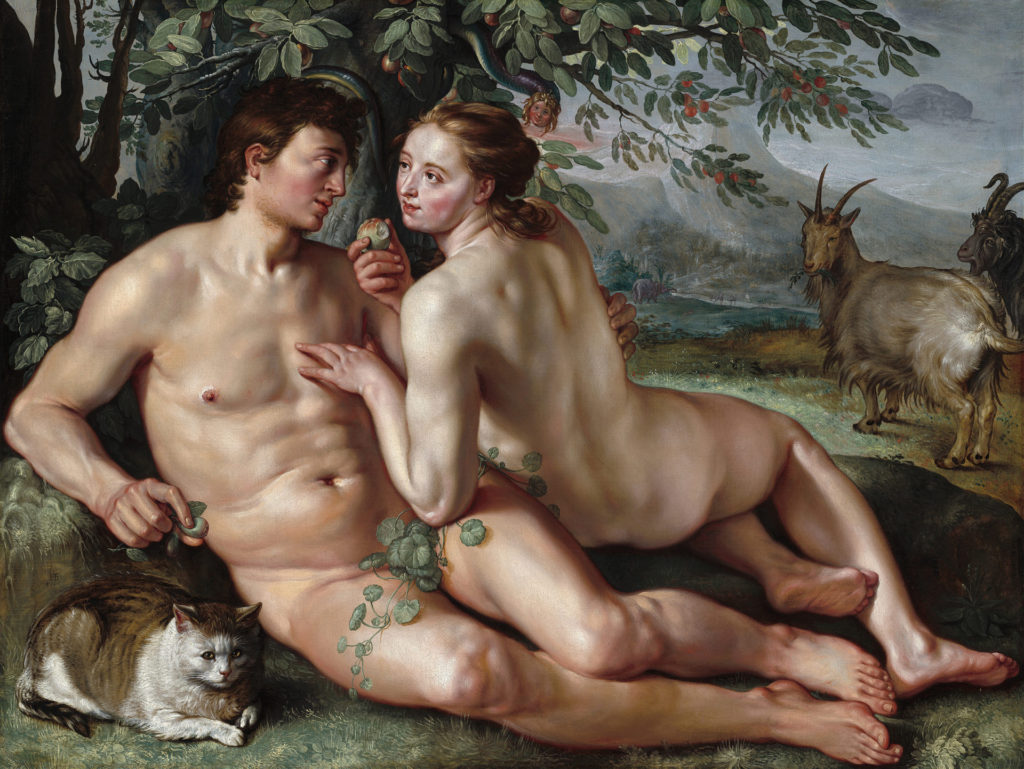I’ll be frank with you. This title is a bit of an exaggeration. Tolkien’s elves are always on the side of good. But that doesn’t mean they didn’t do bad.
I’ve recently noticed that when anyone on the Internet talks about Tolkien and elves and his Christianity someone always says something like “Well, you know, Tolkien’s elves are humans without original sin. They’re like us if we never left the Garden.” Those kinds of statements never seem to go challenged. And that’s bullshit, and it’s bullshit because its wrong.
But what are they talking about to begin with? Well, Christians have this idea that way back at the beginning of time the people (all two of them) lived in a beautiful garden where the food fell from trees and nobody ever got sick or died. And they had it all for the low, low price of never touching a very particular, special tree.

So they touched the tree and ate its fruit. God got real mad and cast the people out into the desert where they must struggle for food, and eventually get sick and die. Furthermore, all of the people’s kids will have to do that, as will their kids, and their kids’ kids, and so on until the present day.
![]() But don’t worry, says Christianity, because we have a deal for you. Two thousand years ago the Romans nailed a dissident to a couple pieces of wood and whoops he was the son of God. Far from getting made this time, God then said “Well, I knew this would happen. That’s why I had a kid. And I forgive you for killing him. And, if you believe in him and his sacrifice, I’ll forgive you for all the other stuff too.” So that’s nice.
But don’t worry, says Christianity, because we have a deal for you. Two thousand years ago the Romans nailed a dissident to a couple pieces of wood and whoops he was the son of God. Far from getting made this time, God then said “Well, I knew this would happen. That’s why I had a kid. And I forgive you for killing him. And, if you believe in him and his sacrifice, I’ll forgive you for all the other stuff too.” So that’s nice.
Because of this, the Christians say, God’s kid will come back at the end of time and lead us all back to paradise. And everyone that died in the interim will come back too.
But what does that have to do with the elves? Did they start out in Paradise? Well…
Melkor… sent shadows and evil spirits among them.
J. R. R. Tolkien, The Silmarillion, page 46.
The Elves first appeared in ‘the East’ and a in a region surrounded by waters. Oh, and they never suffer the sickness of age. So far, so good. It matches up pretty well with Eden. But the Elven Urheimat was no paradise. Satan stalked the woods and waylaid travelers; the Elves greeted the Angels of God with fear.
But they did end up in Paradise… or, most of them did anyway. Eventually God’s Angels did get a whole bunch of them to walk with them to the Undying Lands, a perfect paradise beyond the western sea. There were stragglers along the way. Quite a few got to the eastern edge of the sea and were like “Hey, it’s nice here. There’s no big rush. Let’s hang back a little.” Some never joined to begin with.
And then you’ve got the Noldor. Those Elves finished the journey. Woohoo! They made it all the way to Paradise. Nothing could go wrong now! Oh, wait, no, they fall like Adam and Eve in the Garden.
Even Melkor found some ears that would heed him, and some tongues that would enlarge what they heard; and his lies passed from friend to friend as secrets of which the knowledge proves the teller wise.
J. R. R. Tolkien, The Silmarillion, page 70.
Melkor took on the serpent’s role and whispered to the people. He told them how awesome it would be outside the Garden, and that maybe God and his Angels don’t have it all figured out. Then Melkor stole the Silmarils, a set of of glowing gems made by the Elves for God’s Angels, out of the Sun and and the Moon. He also killed some pretty important people along the way. The Noldor lost their shit, swore eternal vengeance, and crossed the sea.
The Angels didn’t like that very much, and told the Noldor not to come back. And so the Noldor were exiled to the lands of death and struggle where, if they stayed overlong, they would be doomed to fade from the Earth.
But don’t worry! After their struggles all turn out to have been stupid, pointless, and to have made things significantly worse for everybody the Angels forgave them. With Sauron’s defeat they got to take the straight path back to Paradise. Frodo even got to go with them. But some still stayed; the Elves are neither unfallen nor sinless.